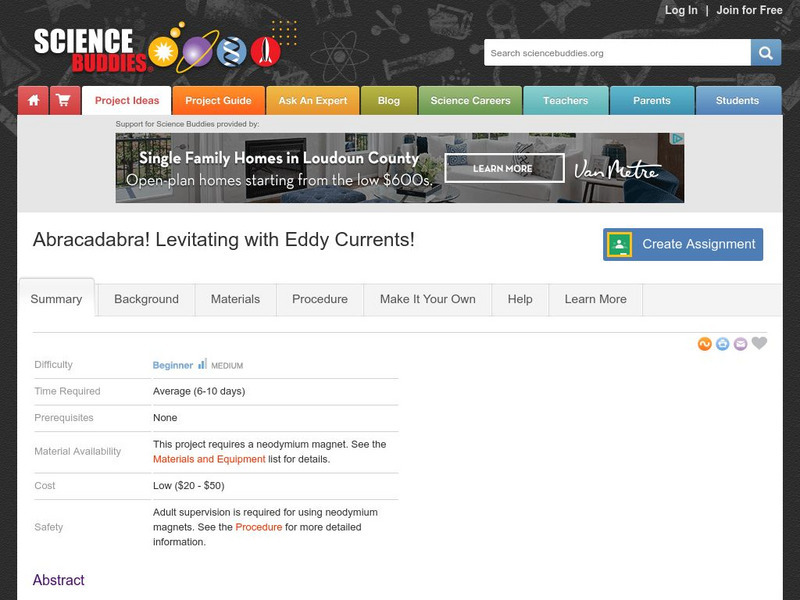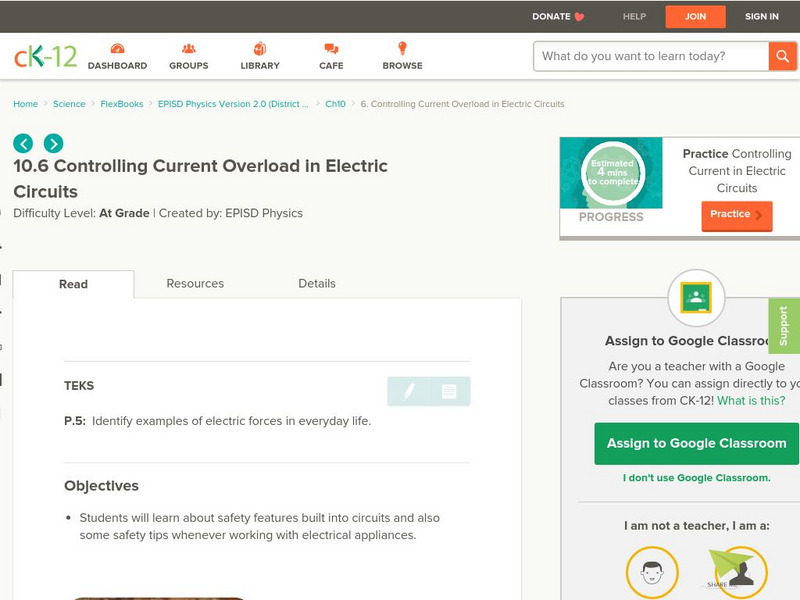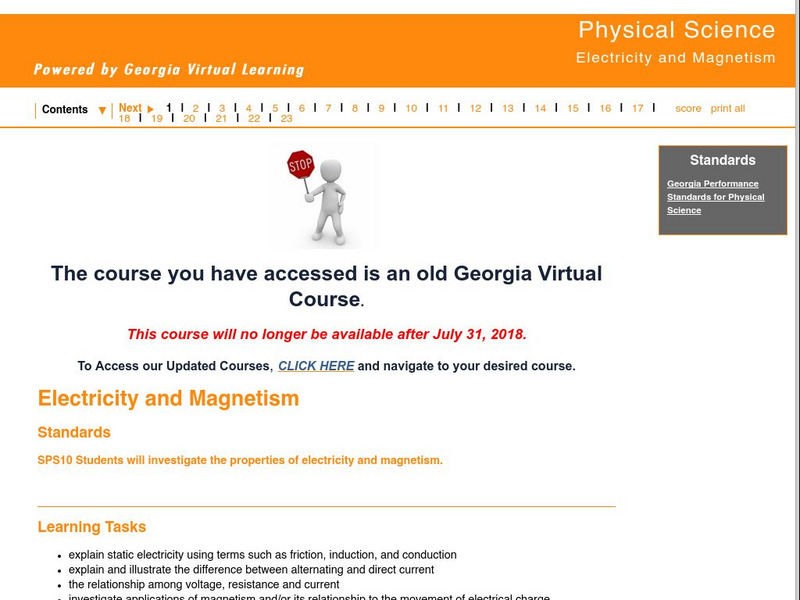Hi, what do you want to do?
Physics Aviary
Physics Aviary: Practice Problems: Rl in Ac Problem
Determine the rms current and voltage in an RL circuit powered by an AC power supply.
Physics Aviary
Physics Aviary: Practice Problems: Rlc in Ac Problem
Determine the rms current and voltage in an RLC circuit powered by an AC power supply.
Physics Aviary
Physics Aviary: Rail Gun Lab
This lab was designed to have students test the factors that affect the acceleration of a metal bar that is carrying a current through a magnetic field.
Science Buddies
Science Buddies: Abracadabra! Levitating With Eddy Currents!
Did you know that not all trains run on tracks? Some of the world's fastest trains are magnetic levitation trains (maglev). This means that the carriage of the train is suspended over the rails with no support, but only with magnetic...
TeachEngineering
Teach Engineering: Particle Sensing: The Coulter Counter
Students are presented with a short lesson on the Coulter principle, an electronic method to detect microscopic particles and determine their concentration in fluid. Depending on the focus of study, students can investigate the...
Boston University
Elementary Physics: Current and Resistance
A general summary of electrical resistance including a comparison of AC and DC current.
CK-12 Foundation
Ck 12: Physics Simulation: Ac Transformer
[Free Registration/Login Required] Learn about how high-voltage alternating current (AC) electricity generated by a power station is converted into low-voltage AC electricity for your home using this interactive simulation. A PDF...
CK-12 Foundation
Ck 12: Controlling Current Overload in Electric Circuits
[Free Registration/Login may be required to access all resource tools.] Electrical circuits have safety features like fuses and circuit breakers to prevent an overload, which could cause a fire. This lesson explains how these work....
Physics Classroom
The Physics Classroom: What Is an Electric Circuit?
In this tutorial the concept of electric potential difference is discussed. Electric potential is the amount of electric potential energy per unit of charge that would be possessed by a charged object if placed within an electric field...
Physics Classroom
The Physics Classroom: Electric Circuits: Circuit Connections: Parallel Circuits
When two or more electrical devices in a circuit are connected, it is known as a series connection or a parallel connection. When all the devices are connected using parallel connections, the circuit is referred to as a parallel circuit....
NASA
Nasa: Oersted and Ampere Link Electricity
NASA provides a nice blending of the achievements of three scientists, Oersted, Ampere, and Maxwell. This done by NASA-sponsored International Solar-Terrestrial Physics group. Lots of pictures, diagrams, and scientific explanation. Good...
American Association of Physics Teachers
Com Padre Digital Library: Open Source Physics: Magnetic Force Three Wires Model
Investigate the idea of the force between straight current-carrying wires in this magnetic force simulation. See if you can rank the wires from largest to smallest based on the magnitude of their currents.
Science and Mathematics Initiative for Learning Enhancement (SMILE)
Smile: Electron Current Flow
A teacher lesson plan which could be easily converted into an idea for a student project or presentation. This page describes an activity in which the water-electricity analogy is used to investigate the relationship between current,...
Physics Classroom
The Physics Classroom: Power Revisited
This tutorial visits the concept of power. You will learn to develop new equations that express power in terms of current, electric potential difference and resistance.
Museum of Science
The Atom's Family: Fruity Electricity
Frankenstein's electricity is out. In this activity, students help him find another source of energy using citrus fruit. Good for students who want to do their own projects or for class lessons.
Georgia Department of Education
Ga Virtual Learning: Physical Science: Electricity and Magnetism
Students learn about static electricity using terms such as friction, induction, and conduction. They also explain and illustrate the difference between alternating and direct current, and understand the relationship among voltage,...
CK-12 Foundation
Ck 12: Physical Science: Chemical and Solar Cells
[Free Registration/Login may be required to access all resource tools.] How chemical and solar cells work and produce an electric current.
Ducksters
Ducksters: Physics for Kids: Ohm's Law
Kids learn about Ohm's law in the science of electricity and physics including current, resistance, voltage, example problems, and V=IR.
National High Magnetic Field Laboratory
Magnet Academy: Timeline of Electricity and Magnetism: 1880 1889
Nikola Tesla and Thomas Edison duke it out over the best way to transmit electricity and Heinrich Hertz is the first person (unbeknownst to him) to broadcast and receive radio waves.
CK-12 Foundation
Ck 12: Physics Simulation: Marquee Lights
[Free Registration/Login Required] Learn about different ways you can wire an electric circuit, and how the brightness of the lights depends on how they are configured using this interactive simulation. A PDF worksheet and a video...
Khan Academy
Khan Academy: Electric Potential Difference and Ohm's Law Review
Review the key terms, equations, and skills related to Ohm's law, including how electric potential difference, current, and resistance are related.
Physics Aviary
Physics Aviary: Practice Problems: Current in a Wire Problem
Determine the resistance of a wire based on its composition and its physical dimensions. Find the current that would flow through the wire when the wire is connected to a certain voltage.
Physics Aviary
Physics Aviary: Series Circuit Lab
This lab is designed to have students investigate the relationships between voltage, resistance and current in a series circuit with up to three passive components. The batteries in this simulation can be varied from ideal batteries to...
Khan Academy
Khan Academy: Dc Circuit and Electrical Power Review
Review the components of a circuit and their symbols such as battery, resistor, and switch. Analyze how the power of a resistor is related to the current and electric potential difference across the resistor.


















